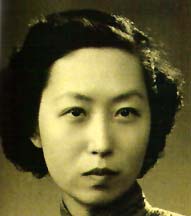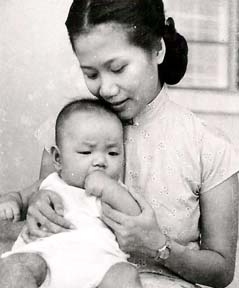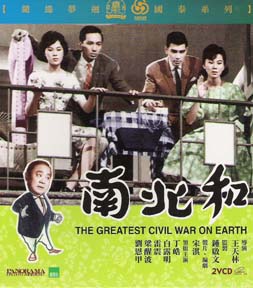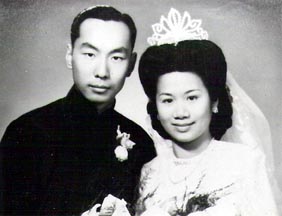(Ming Pao) The Shanghainese in Hong Kong: As Told by the Second Generation of the Shanghai Gang. By Helen Lai. October 1, 2006.
[in translation]
When Hong Kong was returned to China in 1997, the son of a rich Shanghainese merchant became the Chief Executive. At that time, the government statistics bureau no longer asked, "Where did you come from?" We are all Chinese citizens and one big family. In the statistical data bank, there is no longer the proportion of Hong Kong residents who came from Shanghai and there is only the proportion of Hong Kong residents who spoke the Shanghainese dialect.
When the Jiang Zemin-led Shanghai gang fell in their power base last month, everybody was buzzing. In Hong Kong, the Chief Executive was replaced last march, and this became an episode in Hong Kong history. But the fading of the Shanghai gang in Hong Kong took place even earlier, perhaps ...
The following is the story of one second-generation Shanghai gang member.
Roland Soong, 57 years old, was born in Shanghai in 1949, the year when the new China was established.
His father was one of the leaders of the Mandarin-language motion picture era in Hong Kong, Stephen Soong (宋淇). Stephen Soong wrote the script for The Greatest Civil War on Earth (南北和), a comedy about the natural and learned prejudices between southerners and northerners in Hong Kong. He was also one of the seven experts on Dream Of The Red Chamber. All these things happened after he arrived in Hong Kong from Shanghai.
Four weeks after Roland Soong was born in Shanghai, his family left for Hong Kong before the People's Liberation Army arrived. His mother held him in her arms, a maid held his sister in her arms and his dad carried the diapers, and they took an airplane for Hong Kong. From age 0 to age 5, he heard only Shanghainese dialect. The little friends at birthday parties were all from the Shanghai gang, including people such as his sister's friend Josephine Siao. The first time that he went to kindergarten, he could not understand a single word of Cantonese.
Stephen Soong studied comparative literature at Yenching University in Beijing while his future wife Mae Soong studied literature at St. John's University in Shanghai. In Shanghai, Stephen Soong sold pharmaceuticals, ran imports/exports, and the family held entire streets of real estate properties. When they first arrived in Hong Kong, they brought quite a bit of money. They thought that Shanghai people can trust other Shanghai people and so they deposited their money into the Four Seas Bank run by some Shanghai people. At the time, they lived at Bowen Road and they had a "huge" car. But the Shanghainese bankers ran away with the funds and the family went from very rich to very poor. Both parents were forced to find work, such as translating novels from English into Chinese. That was in the mid-1950's.
During this period, Stephen Soong got to know people such as Raymond Chow and King Hu. Shanghai people trusted Shanghai people, and they all went into the motion picture business. During the next ten years or so, he worked for Cathay Motion Pictures, Shaw Brothers and Golden Harvest. At the time, the population of Hong Kong was small and therefore it was not a prime market. "In those days, Cantonese-language motives were 'seven day jobs' and therefore of poor quality. It was Run Run Shaw who came up with the idea of selling overseas. Run Run Shaw was the sixth son of the family, and the fifth son Run Me Shaw managed several hundred movie houses across southeast Asia. The Chinese over there worked very hard and what did they do on weekends? Go to the movies! Run Me Shaw was concerned about now having enough movies to exhibit, or being forced to pay exorbitant prices by film producers. Therefore, Run Run Shaw went into motion picture production. At the time, the schedule and budget for film-making were precisely calculated so that a film could be completed in three weeks."
As executive producer, Stephen Soong had to find people to write scripts. He found his "one of his own kind" in Eileen Chang. At the time, Eileen Chang had just immigrated to the United States and needed money. "The stories were all based upon American or European novels, such as those by Jane Austen. The stories were translated over with the characters changed to Chinese." The motion picture industry was thoroughly dominated by the Shanghai gang. In conference rooms and film studios, the actors, directors and bosses spoke Shanghainese. When new actors and actresses started their careers and had no money to do anything, they might go to the Soong home to have meals.
The demise of the Shanghai gang occurred in the 1970's. The business got bigger and bigger. In order to expand the Taiwan market, they knew that they had to recruit people from Taiwan and thus came people like Bridget Lin (林青霞) and Joan Lin (林鳳嬌). So the power of the Shanghai gang decreased and they cannot use "their own kind" in everything.
Roland Soong lived in Hong Kong until 1967, when the riots started. His dad was worried that his children might be hurt by his own status as an intellectual and so sent them overseas. Roland Soong lived in the United States for thirty years and returned to Hong Kong in 2003. From start to now, he did not have much of an impression about Shanghai. The Shanghainese people that he knew all came from his childhood. He remembered that when The Greatest Civil War on Earth was being made, he was around 11 or 12 and he was wandering around the movie studio. That movie portrayed the Hong Kong perception of the Shanghainese people: wily, with business savvy, wants to cheat you of all your money. Meanwhile, the Shanghainese looked at the Cantonese people: lazy, rigidly following previous rules, only knowing to follow what their forebears did. "This is what my father kept hearing people say, and that might be what people thought in that era."
Yet, from his father's career, here was a man who went into diverse businesses in Shanghai and when he arrived in Hong Kong, he went into translation, motion pictures, magazine publishing, Chinese University of Hong Kong, and even stock investments. If you ask him what the Shanghainese are like, Roland Soong might say: "Plenty of ideas, quick minds." "If you don't have money today, you can't just sit there and complain non-stop. There will always be a way. These types of people are harder to find nowadays." This generation of Shanghainese are home-grown and home-bred and thoroughly integrated. Having been away for so many years, Roland Soong does not regard himself as Shanghainese unless the subject was brought up in a discussion. But he still likes to patronize traditional Shanghai barber shops. The one that he patronized ever since he was a child near Prince Edward Road just closed down this August because it could not afford the increased rent demanded by the landlord.
 Eileen Chang: "In 1954, Stephen Soong's wife Mae accompanied me to the photographic studio at the corner of King's Road in Hong Kong to take this photo." |
 Roland and Mae Soong. 1950. |
 The Greatest Civil War on Earth (1961) |
 Wedding photo of Stephen and Mae Soong |
(Ming Pao) 上海人在香港﹕上海幫第二代的告白. 黎佩芬. October 1, 2006.
九七年香港回歸,一個上海富商之子當上特首,政府統計處則由這時候開始,查家宅不再問人「你是哪裏人」。大家都是中國籍,一家親。從此,人口統計數據中,再沒有香港上海人的人口數字,只有說上海話的香港人比例。
江澤民系上海幫在原產地倒台,一陣嘩然。香港特首去年3月換人,已經寫入香港史。香港上海幫的故事,沒落於更早,還是……
下面是兩個上海幫第二代的告白。
宋淇之子與張愛玲
宋以朗,57歲,生於1949年,也就是新中國成立那年。
他爸是香港國語片時代上海幫的開山祖之一宋淇,講述香港南北兩方人先天後天養成相互敵視的喜劇《南北和》的劇本,就出自他手。他又是《紅樓夢》七大翻譯專家之一。這些都是他來港以後的事。
宋以朗出世4個星期,解放軍未到上海,他媽鄺文美(方馨)抱他,工人抱他姊,他爸宋淇托幾袋尿片,一家人乘飛機來香港。0至5歲,他耳朵聽的只有上海話,生日派對上的大小朋友,全是上海幫,當中有他姐的朋友蕭芳芳。念書了,第一次上幼稚園,一句廣東話也聽不懂。
宋淇在燕京大學念比較文學,鄺文美則在上海聖約翰大學念文學。在上海時,經營賣藥、出入口等生意,有一條街的物業。初來時,帶很多錢,一心想要信便信上海人,把錢存進上海人開的四海銀行。住在半山寶雲道,有架「幾巴閉」的私家車。後來開銀行的夾帶私逃,他們由最有錢變成最窮,父母二人,逼要外出打工,靠翻譯小說賺稿費。那是50年代中。
其間,他爸認識了鄒文懷、胡金銓,上海人信上海人,被拉攏入了電影圈,10年裏,先後加入電影懋業公司,邵氏和嘉和,拍國語片賣埠。那時香港人小,不是第一市場。「昔前的粵語片,七日鮮,不入流。賣埠是邵逸夫想出來的。他排第六,排第五的哥哥在東南亞管理幾百間電影院。中國人在那頭日捱夜捱,周末有什麼事做﹖看戲囉。怕不夠戲放,又怕被人吊高來賣,於是叫個細佬搞電影。那時拍戲的資金時間都計得好準,3 個星期要成事。」
不再自覺是上海人
當上製片,要找人寫劇本,宋淇去找「自己人」張愛玲。張愛玲剛移民美國,正在愁生活問題。「故事都是英美小說,好像Jane Austen那些照譯過來,主角變成中國人。」圈內徹頭徹尾上海幫,會議室,片場裏,演員導演老闆,說的都是上海話。明星仔初入行人工微薄,會去他家吃飯。
上海幫的沒落,是當步入70年代,生意愈做愈大。為了開拓台灣市場,他們意識要到台灣招人,於是有了林青霞、林鳳嬌。話事權小了,不能再用「自己人」。
宋以朗在香港待至67年,鬧暴動,他爸怕姐弟倆被他的知識分子身分牽連,把他們送出國。宋以朗在美國生活了30年,03年回港。由頭到尾,他對上海沒幾多印象。認知中的上海人,都是來自他的童年往事。他記得,拍《南北和》時他十一二歲,在片場玩。片中刻劃香港人眼中的上海人﹕古惑、識做生意、要當心呃晒你 錢。上海人眼中的廣東人﹕懶、默守成規、只懂走父親老路。「是我爸聽別人說的,可以說是那個年頭的寫照」。
然而,看他爸,搞生意林林種種,來港後做翻譯,搞電影,搞雜誌,到中大任職,到後來炒股票,如果問他上海人是怎樣的﹖他會說﹕點子多,腦筋靈。「今日無錢,不會光坐手停口停在抱怨,永遠有辦法。這種人,今日難搵喎。」上海人,到了這一代,土生土長的,大都已被同化。離鄉別井多年,不特別聊起,宋以朗也不自覺自己是上海人,但他還是愛光顧傳統上海理髮店。他在太子附近自小幫襯的那家,今年8月因業主加租結業。